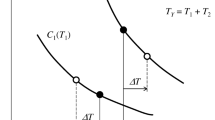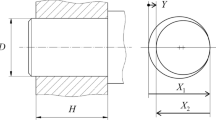Abstract
The optimization of dimensional tolerances requires that a cost-tolerance function is evaluated consistently for all the part features involved in a given functional requirement. This is difficult because the parameters of commonly used functions are set using cost data from various sources and on possibly different scales. As an alternative, the paper proposes a revised form of one of the available cost-tolerance functions (reciprocal power), which expresses its parameters in empirical relationship with a set of design specifications on the toleranced features. These include the nominal dimension, the shape, the surface area, and the material. Following a previous study based on cost data available in literature, the values and expressions of the parameters are validated and refined using a feature-based method for the estimation of machining cost. The properties of the extended function allow to develop a simplified method for tolerance allocation that avoids the task of solving the optimization problem; it is a modified version of proportional scaling where the initial solution satisfies optimal ratios between tolerances. The discussion of the results and an application example help to justify the proposed function on grounds of correctness, convenience, and reference value.



Similar content being viewed by others
Availability of data and material
The author confirms that the data supporting the findings of this study are available within the paper.
References
Chase KW (1999) Minimum-cost tolerance allocation. In Drake PJ (ed) Dimensioning and tolerancing handbook. McGraw-Hill, New York
Singh PK, Jain PK, Jain SC (2009) Important issues in tolerance design of mechanical assemblies. Part 2: tolerance synthesis. Proc IMechE Part B J Eng Manuf 223:1249–1287
Karmakar S, Maiti J (2012) A review on dimensional tolerance synthesis: paradigm shift from product to process. Assem Autom 32(4):373–388
Hallmann M, Schleich B, Wartzack S (2020) From tolerance allocation to tolerance-cost optimization: a comprehensive literature review. Int J Adv Manuf Technol 107(11–12):4859–4912
Armillotta A (2020) Selection of parameters in cost-tolerance functions: review and approach. Int J Adv Manuf Technol 108:167–182
Chase KW, Greenwood WH (1988) Design issues in mechanical tolerance analysis. Manuf Rev 1:50–59
Chase KW, Greenwood WH, Loosli BG, Hauglund LF (1990) Least cost tolerance allocation for mechanical assemblies with automated process selection. Manuf Rev 3:49–59
Wu Z, ElMaraghy WH, ElMaraghy HA (1998) Evaluation of cost-tolerance algorithms for design tolerance analysis and synthesis. Manuf Rev 1:168–179
Edel DH, Auer TB (1964) Determine the least cost combination for tolerance accumulation in a drive shaft seal assembly. Gen Motors Eng J Fourth Quart 37–38
Bandler JW (1974) Optimization of design tolerances using nonlinear programming. J Optim Theory Appl 14:99–114
Spotts MF (1973) Allocation of tolerances to minimize cost of assembly. Trans ASME J Eng Ind 95:762–764
Sutherland GH, Roth B (1975) Mechanism design: accounting for manufacturing tolerances and costs in function generating problems. Trans ASME J Eng Ind 97:283–286
Speckhart FH (1972) Calculation of tolerance based on a minimum cost approach. Trans ASME J Eng Ind 94:447–453
Michael W, Siddall JN (1981) The optimal tolerance assignment with less than full acceptance. Trans ASME J Mech Des 103:855–860
Dong Z, Hu W, Xue D (1994) New production cost-tolerance models for tolerance synthesis. Trans ASME J Eng Ind 116:199–206
Chase KW, Parkinson AR (1991) A survey of research in the application of tolerance analysis to the design of mechanical assemblies. Res Eng Des 3:23–37
Ashiagbor A, Liu HC, Nnaji BO (1998) Tolerance control and propagation for the product assembly modeler. Int J Prod Res 36:75–93
Jefferson TR, Scott CH (2001) Quality tolerancing and conjugate duality. Ann Oper Res 105:185–200
Ghie W (2009) Functional requirement cost for product using Jacobian-Torsor model. Int CIRP Conf Comput Aid Tolerancing Annecy France
Sahani AK, Jain PK, Sharma SC, Bajpai JK (2014) Design verification through tolerance stack up analysis of mechanical assembly and least cost tolerance allocation. Procedia Mater Sci 6:284–295
Trucks HE (1987) Design for economical production. Soc Manuf Eng Dearborn MI
Bjørke Ø (1989) Computer-aided tolerancing. ASME Press, New York
Kanai S, Onozuka M, Takahashi H (1995) Optimal tolerance synthesis by genetic algorithm under the machining and assembling constraints. Int CIRP Sem Comput Aid Tolerancing Tokyo 235–250
ISO 286–1 (2010) Geometrical product specifications (GPS), ISO code system for tolerances on linear sizes. Part 1: Basis of tolerances, deviations and fits. International Organization for Standardization, Geneva, Switzerland
Yeo SH, Ngoi BK, Chen H (1996) A cost-tolerance model for process sequence optimisation. Int J Adv Manuf Technol 12(6):423–431
Yeo SH, Ngoi BKA, Poh LS, Hang C (1997) Cost-tolerance relationships for non-traditional machining processes. Int J Adv Manuf Technol 13:35–41
Yeo SH, Ngoi BKA, Chen H (1998) Process sequence optimization based on a new cost-tolerance model. J Intell Manuf 9:29–37
Khodaygan S (2019) Meta-model based multi-objective optimisation method for computer-aided tolerance design of compliant assemblies. Int J Comput Integr Manuf 32:27–42
Lin ZC, Chang DY (2002) Cost-tolerance analysis model based on a neural networks method. Int J Prod Res 40:1429–1452
Cao Y, Zhang H, Mao J, Yang J (2010) Novel cost-tolerance model based on fuzzy neural networks. Proc IMechE Part B J Eng Manuf 224:1757–1765
Wang Y, Zhai W, Yang L, Wu W, Ji S, Ma Y (2007) Study on the tolerance allocation optimization by fuzzy-set weight-center evaluation method. Int J Adv Manuf Technol 33:317–322
Wang G, Yang Y, Wang W, Si-Chao LV (2016) Variable coefficients reciprocal squared model based on multi-constraints of aircraft assembly tolerance allocation. Int J Adv Manuf Technol 82:227–234
Dong Z, Wang GG (1998) Automated cost modeling for tolerance synthesis using manufacturing process data, knowledge reasoning and optimization. In: ElMaraghy HA (ed) Geometric design tolerancing: theories, standards and applications. Chapman & Hall, London, pp 282–293
Dimitrellou SC, Diplaris SC, Sfantsikopoulos MM (2007) Cost-competent tolerancing in CAD. Int J Adv Manuf Technol 35:519–526
Dimitrellou SC, Diplaris SC, Sfantsikopoulos MM (2008) Tolerance elements: an alternative approach for cost optimum tolerance transfer. J Eng Des 19:173–184
Etienne A, Dantan JY, Siadat A, Martin P (2007) Cost estimation for tolerance allocation. Int CIRP Conf Comput Aid Tolerancing Erlangen Germany
Etienne A, Dantan JY, Siadat A, Martin P (2009) Activity-based tolerance allocation (ABTA): driving tolerance synthesis by evaluating its global cost. Int J Prod Res 47:4971–4989
Miramadi S, Etienne A, Hassan A, Dantan JY, Siadat A (2012) Cost estimation method for variation management. Int CIRP Conf Comput Aid Tolerancing Huddersfield UK
Gerth RJ, Klonaris P, Pfeiffer T (1999) Cost tolerance sensitivity analysis for concurrent engineering design support. Int CIRP Conf Comput Aid Tolerancing Twente Netherlands 313–323
Gerth RJ, Pfeiffer T (2000) Minimum cost tolerancing under uncertain cost estimates. IIE Trans 32:493–503
Niazi A, Dai JS, Balabani S, Seneviratne L (2006) Product cost estimation: technique classification and methodology review. ASME J Manuf Sci Eng 128:563–575
Garcia-Crespo A, Ruiz-Mezcun B, Lopez-Cuadrado JL, Gonzalez-Carrasco I (2011) A review of conventional and knowledge-based systems for machining price quotation. J Intell Manuf 22:823–841
Jha NK (1996) Probabilistic cost estimation in advance of production in a computerized manufacturing system through stochastic geometric programming. Comput Ind Eng 30(4):809–821
Maropoulos PG, Baker RP, Paramor KYG (2000) Integration of tool selection with design, Part 2: Aggregate machining time estimation. J Mater Proc Technol 107:135–142
Perera GIP (2014) Operation based cost assessment of machined parts in the early design stages. Eng 8:57–65
Tanner JP (2006) Practical cost estimating for manufacturing. In Crowson R (ed.) Factory operations: planning and instructional methods. CRC Press Boca Raton FL
Creese RC, Adithan M, Pabla BS (1992) Estimating and costing for the metal manufacturing industries. Marcel Dekker, New York
Polgar KC (1996) Simplified time estimation for basic machining operations. MSc Thesis, Massachusetts Institute of Technology
Lovejoy W, Fixson S, Jackson S (2005) Product costing guidelines. University of Michigan, Integrated Product Development
Boothroyd G, Dewhurst P, Knight WA (2011) Product design for manufacture and assembly, 3rd edn. CRC Press, Boca Raton FL
Ou-Yang C, Lin TS (1997) Developing an integrated framework for feature-based early manufacturing cost estimation. Int J Adv Manuf Technol 13:618–629
Feng CX, Kusiak A, Huang CC (1996) Cost evaluation in design with form features. Comput Aided Des 28(11):879–885
Geiger TS, Dilts DM (1996) Automated design-to-cost: integrating costing into the design decision. Comput Aided Des 28(6/7):423–438
Evans DH (1975) Statistical tolerancing: the state of the art. Part III: shifts and drifts. J Qual Technol 7(2):72–76
Fischer BR (2004) Mechanical tolerance stackup and analysis. Marcel Dekker, New York
Armillotta A (2020) Concurrent optimization of dimensions and tolerances on structures and mechanisms. Int J Adv Manuf Technol 111:3141–3157
Drozda TJ, Wick C, Mitchell P, Bakerjian R, Benedict JT, Veilleux RF (1983) Tool and manufacturing engineers handbook, Vol. 6: Design for manufacturability. Soc Manuf Eng Dearborn MI
Uddeholm, (2019) Cutting data recommendations. Böhler-Uddeholm, Vienna
Funding
The author received no specific funding for this work.
Author information
Authors and Affiliations
Corresponding author
Ethics declarations
Conflict of interest
The author declares no competing interests.
Additional information
Publisher's note
Springer Nature remains neutral with regard to jurisdictional claims in published maps and institutional affiliations.
Rights and permissions
About this article
Cite this article
Armillotta, A. An extended form of the reciprocal-power function for tolerance allocation. Int J Adv Manuf Technol 119, 8091–8104 (2022). https://doi.org/10.1007/s00170-021-08579-x
Received:
Accepted:
Published:
Issue Date:
DOI: https://doi.org/10.1007/s00170-021-08579-x




